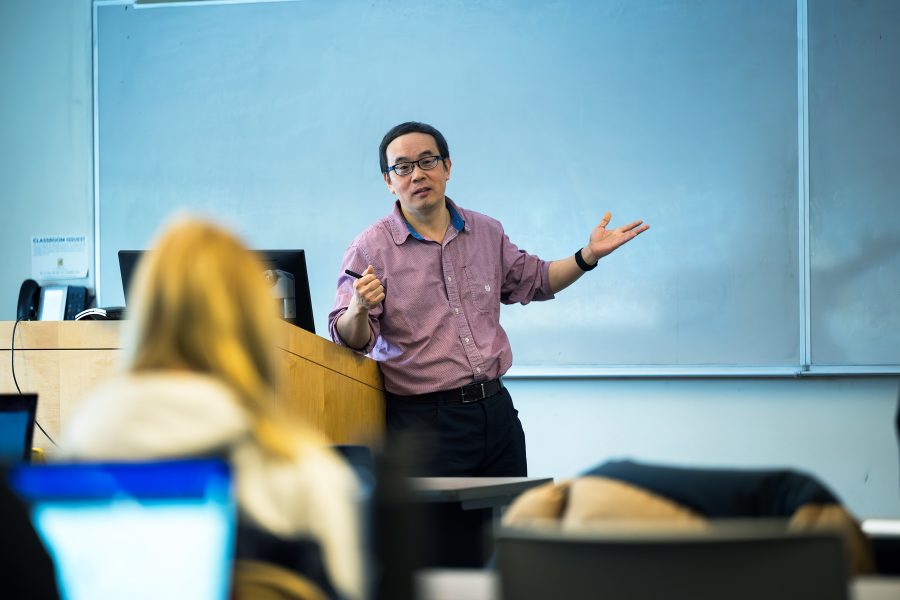
In his new role as the College of Computing’s associate dean, Yu Cai draws on his extensive background in cybersecurity, computer networks, and computing education. The experience he brings to the newly created position provides him with deep insights into academic administration, curriculum development, and student engagement.
In this College of Computing Q&A, Cai shares his plans for the future and reflects on the students, research, and sense of community that have been his guiding principles during almost two decades at Michigan Tech.
Q: You’ve been teaching at Michigan Tech for nearly 20 years. What do you like about working here? Where do you find the most meaningful rewards? Looking back on your time at Tech, what are you especially proud of?
YC: I find immense fulfillment in the collegial environment and the opportunities for impactful research. The university nurtures a culture of cross-disciplinary teamwork, allowing me to engage in a variety of projects in cybersecurity and computing. This collaborative atmosphere, along with access to state-of-the-art facilities, has enabled me to address real-world challenges and make significant contributions to the field. Furthermore, working with bright and motivated students has been particularly rewarding. Their enthusiasm compels me to continually refine my teaching/research methods and remain at the forefront of technological advancements.
I take pride in several key achievements during my time here, particularly in conducting impactful research supported by multi-million-dollar grants from various sources and in developing robust undergraduate programs in cybersecurity and computer networks. These initiatives have prepared numerous students with the skills required to thrive in a rapidly evolving technological landscape. Additionally, my role as an ABET program evaluator and guiding our programs through two successful reaccreditation cycles have ensured our programs meet the highest standards of quality and relevance, reinforcing Michigan Tech’s reputation for academic excellence.
Q: Congratulations on receiving the Michigan Tech Provost’s Award for Sustained Teaching Excellence this spring! What are some of the components of teaching excellence? What makes for a successful learning experience?
YC: Teaching excellence is rooted in engagement, passion, and adaptability. Demonstrating genuine enthusiasm for the subject can inspire and motivate students, creating a dynamic and interactive learning atmosphere. Effective teaching also requires adapting to innovative methods and technology challenges, blending traditional lectures with hands-on activities and modern technological tools to ensure the material is relevant and up-to-date.
Encouraging collaboration and critical thinking through group projects, discussions, and real-world case studies enhances the learning process. Integrating theoretical knowledge with practical applications through labs, simulations, and real-world projects helps students bridge the gap between theory and practice.
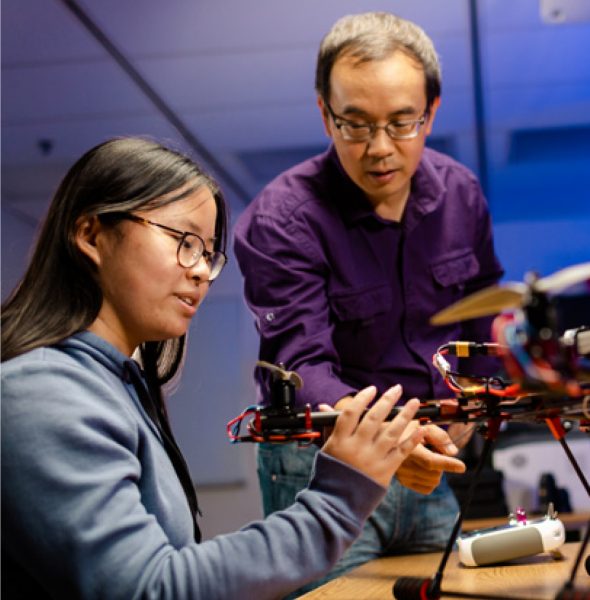
A successful learning experience is the natural result of active participation and practical application.
Q: Broadening participation in computing programs and activities is an important aspect of your new position. What are some of your ideas for creating and maintaining a welcoming and inclusive environment in the college?
YC: To broaden participation in computing programs and activities, I plan to implement several initiatives to create and maintain a welcoming and inclusive environment in the college. These include establishing mentorship programs that connect underrepresented students with peers, faculty, and industry professionals; promoting diverse role models through guest lectures and seminars; and promoting inclusive teaching practices and training. Additionally, I aim to develop outreach programs in local schools and community colleges to attract students with diverse backgrounds, provide scholarships and support networks for underrepresented groups, and work with student organizations to promote broader participation.
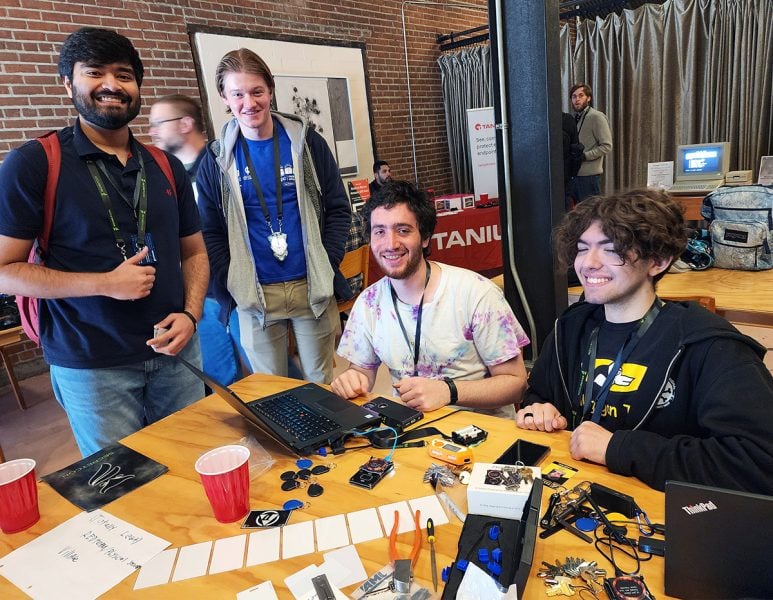
Q: The students you coach have achieved impressive results in national cybersecurity competitions. How do you view your role as coach and why do you think your students are so successful?
YC: Michigan Tech has exceptional students, and as a faculty coach, my most effective roles are as a cheerleader and financial supporter. I always try my best to provide continuous encouragement and motivation to students, cultivating a positive and resilient mindset that empowers students to address complex challenges. By championing their efforts and celebrating their successes, I help build their confidence and perseverance.
Q: Artificial Intelligence is becoming enmeshed with virtually all computing-related activities. Looking forward, what are some of the ways that AI will shape future College of Computing programs, activities, and research?
YC: AI will play a transformative role in shaping future College of Computing programs by becoming a critical component of the curriculum. We will incorporate advanced machine learning and AI techniques into existing courses and develop new AI-focused classes to ensure that students are well-equipped with the skills needed for the evolving tech landscape.
Additionally, AI’s integration will facilitate interdisciplinary projects, enabling students to apply AI in diverse fields such as cybersecurity, data science, and robotics. This approach will not only enhance technical proficiency but also foster innovative problem-solving and critical thinking skills among students.
Regarding research, the Institute of Computing and Cybersystems (ICC) has recently established a Center for Artificial Intelligence. The College will work closely with the ICC’s new AI research center to develop new research projects focused on both foundational AI research and its practical applications. A significant aspect of our research agenda will be the responsible deployment of AI, emphasizing the importance of addressing issues such as bias, fairness, and transparency in AI systems. Through these efforts, we aim to equip our students with the knowledge and skills necessary to contribute significantly to the advancement of AI solutions and to ensure that our academic programs remain at the leading edge of technological progress.
Q: You’ve devoted your professional career to cybersecurity. What led to your interest in the field? Why is it important? What is higher education’s role in protecting the national cyber frontier?
YC: My interest in cybersecurity stems from the critical need to protect sensitive information and infrastructure in a digital world. This field is crucial as cyber threats continue to evolve, posing significant risks to national security, economic stability, and personal privacy. Higher education plays a vital role in safeguarding the national cyber frontier by equipping students with the knowledge and skills needed to anticipate, prevent, and respond to these threats. Through cutting-edge research, interdisciplinary collaboration, and the development of comprehensive cybersecurity curricula, universities can produce a workforce capable of addressing the complex challenges in this rapidly changing landscape.
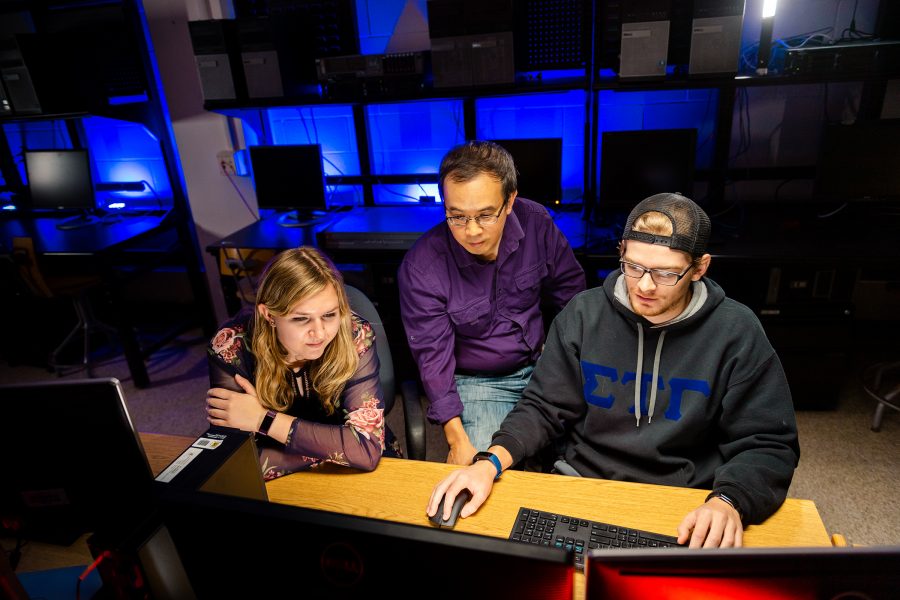
Q: What are some of today’s most urgent cybersecurity issues? How is your research addressing them?
YC: Today’s most urgent cybersecurity issues encompass sophisticated attacks on cyber-physical systems and the growing misuse of AI technologies by malicious actors. My research tackles these challenges by creating advanced threat detection systems that deploy machine learning and AI to identify and mitigate anomalies. We are also investigating secure architectures for enterprise networks and refining techniques to safeguard sensitive data against evolving threats. These efforts are designed to improve defenses against cyberattacks and enhance the resilience of digital systems.
Q: Artificial Intelligence technologies present many opportunities for improving society and human activities, but also introduce new risks. Tell us how your research is exploring the impact of AI on cybersecurity and how the associated risks can be identified and addressed?
YC: My research leverages AI to enhance threat identification and mitigation with greater accuracy and efficiency than traditional methods. By automating the analysis of vast data sets, these AI-driven systems can better detect anomalies and potential attacks, significantly reducing the time and resources needed for incident response.
However, AI systems can themselves be vulnerable to attacks and raise ethical concerns regarding AI-driven decision-making. To address these issues, my research focuses on designing AI models that are resilient against adversarial tactics and developing ethical frameworks for AI use in cybersecurity, including safeguards to ensure AI systems are transparent, accountable, and resistant to exploitation.
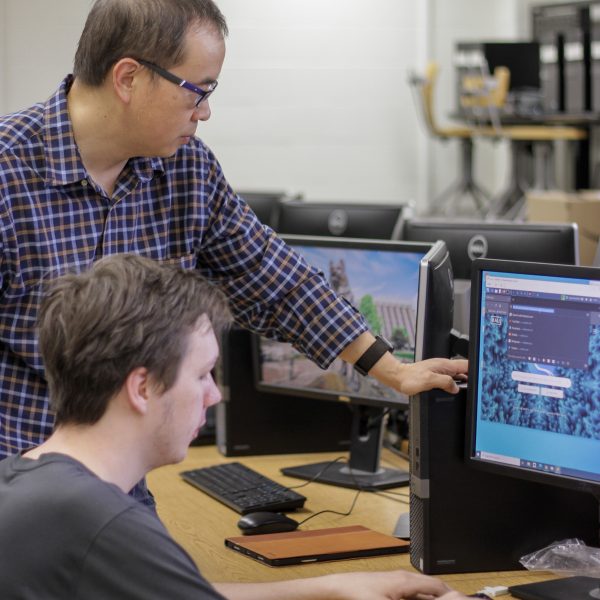
Q: You’re the principal investigator on more than $5 million in external research grants. What advice do you have for new faculty seeking to grow their research portfolios?
YC: Developing clear, compelling proposals that articulate the significance and impact of your research is crucial, as is understanding the priorities of funding agencies. Learning from unsuccessful proposals and refining your approach can significantly improve your chances of securing funding over time. Finally, staying current with emerging trends and aligning your research with these trends can make your work more attractive to potential funders.
My advice for new faculty is to start by building a strong foundation in their area of expertise and actively seek out collaborative opportunities. Networking within your institution and with external partners can open doors to multidisciplinary projects and funding opportunities.
I also secure financial resources and sponsorships to ensure they have access to essential tools, materials, and opportunities for excelling in national cybersecurity competitions. This support allows them to concentrate on enhancing their skills and applying their knowledge effectively, resulting in outstanding performance and impressive achievements.
Q: Community service is a big part of your life. What motivates you to give back and seek ways to enrich those around you? How does community service contribute to a healthy community?
YC: I am motivated by the aspiration to follow the example of a “city on the hill,” aiming to serve as a beacon of positive impact within the local community. By actively participating in local initiatives, I seek to address immediate needs and contribute to creating a healthier and safer environment where everyone feels valued and supported. Through dedicated service and a commitment to excellence, I strive to set an example that inspires others to join in these efforts, working together to build a more connected and thriving community.
My goal is to uplift those around me, tackle pressing local issues, and enhance the overall well-being of the community.
Q: Living in the remote Upper Peninsula isn’t for everyone. What are the advantages of living in the Keweenaw? What can you find here that you can’t find anywhere else?
YC: I enjoy life in a small college town like Houghton, as it offers a harmonious blend of a quiet academic environment and an excellent place to raise a family. The atmosphere provides the perfect balance between intellectual engagement and a close-knit community, fostering meaningful interactions and a supportive network. The region’s year-round outdoor activities are a major attraction for me. I enjoy winter sports such as skiing and equally appreciate other outdoor opportunities that each season brings, including hiking, fishing, gardening, and hunting. This combination of academic tranquility and diverse recreational options makes Keweenaw an ideal place to live and thrive.